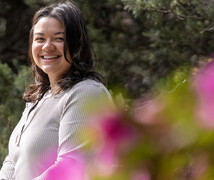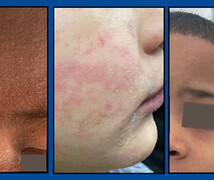As we get older, gradual voice changes, such as hoarseness or vocal weakness, can take a toll on our ability to communicate. But this doesn’t have to be an inevitable part of aging. Here are a few simple suggestions to help keep your voice healthy and strong for years to come.
Your Voice Matters
Difficulty communicating can lead to social withdrawal and even depression. While most people understand that hearing loss is an important consideration as we age, it's just as critical to evaluate and treat voice problems related to getting older. Vocal fold atrophy (or “thinning”), diminished lung power, and overall health decline can contribute to aging voice problems, also known as presbyphonia or presbylaryngis. Duke Health speech pathologist Cristen Paige explains how you can keep your voice in tiptop shape.
1. Be Aware
 Knowledge is power. Even if you haven’t begun experiencing voice changes, knowing the signs can help you nip them in the bud if they begin. These include being asked to repeat yourself more often, having to strain your voice to be heard, or feeling like you are running out of air as you talk. Being proactive can help you keep your voice stronger in the long run.
Knowledge is power. Even if you haven’t begun experiencing voice changes, knowing the signs can help you nip them in the bud if they begin. These include being asked to repeat yourself more often, having to strain your voice to be heard, or feeling like you are running out of air as you talk. Being proactive can help you keep your voice stronger in the long run.
2. Maintain Your Overall Health
 You may be surprised to learn that conditions that affect breathing, like asthma, allergies, and chronic obstructive pulmonary disorder (COPD) can affect your voice. Breath is what powers your voice, so maintaining good lung function is vital to keeping your voice strong.
You may be surprised to learn that conditions that affect breathing, like asthma, allergies, and chronic obstructive pulmonary disorder (COPD) can affect your voice. Breath is what powers your voice, so maintaining good lung function is vital to keeping your voice strong.
Keeping the rest of your body in shape and moving is also important for the voice. Regular exercise helps increase overall stamina, build muscle tone, and improve posture -- all of which contribute to a healthier voice.
3. Practice Good Vocal Hygiene
 As you can imagine, how you treat your throat and larynx (voice box) affects your voice. The larynx should stay moist and flexible, so drink six to eight glasses of water a day. Limit caffeine and alcohol, which dry out your throat. Incorporate “wet snacks -- things like grapes, melons, cucumbers -- that have a lot of water content,” said Paige. Use a humidifier at home to keep the air moist. And, of course, don’t smoke!
As you can imagine, how you treat your throat and larynx (voice box) affects your voice. The larynx should stay moist and flexible, so drink six to eight glasses of water a day. Limit caffeine and alcohol, which dry out your throat. Incorporate “wet snacks -- things like grapes, melons, cucumbers -- that have a lot of water content,” said Paige. Use a humidifier at home to keep the air moist. And, of course, don’t smoke!
4. Use It or "Lose It"
 If you are retired or living alone, you may be talking less. But just like the rest of the body, the voice needs exercise to keep it in good shape. Read aloud, talk to pets, join a choir, or sing in the shower. Look for social opportunities and participate in conversation.
If you are retired or living alone, you may be talking less. But just like the rest of the body, the voice needs exercise to keep it in good shape. Read aloud, talk to pets, join a choir, or sing in the shower. Look for social opportunities and participate in conversation.
5. Voice Therapy
 Many older adults with voice problems can benefit from professional help. A comprehensive voice evaluation can rule out any other causes for voice issues (like tumors or lesions). Your ENT voice specialist may suggest voice therapy, which is like physical therapy for the voice to improve its function, quality, and stamina. Voice therapy is typically covered by insurance, but check with your provider to confirm.
Many older adults with voice problems can benefit from professional help. A comprehensive voice evaluation can rule out any other causes for voice issues (like tumors or lesions). Your ENT voice specialist may suggest voice therapy, which is like physical therapy for the voice to improve its function, quality, and stamina. Voice therapy is typically covered by insurance, but check with your provider to confirm.





